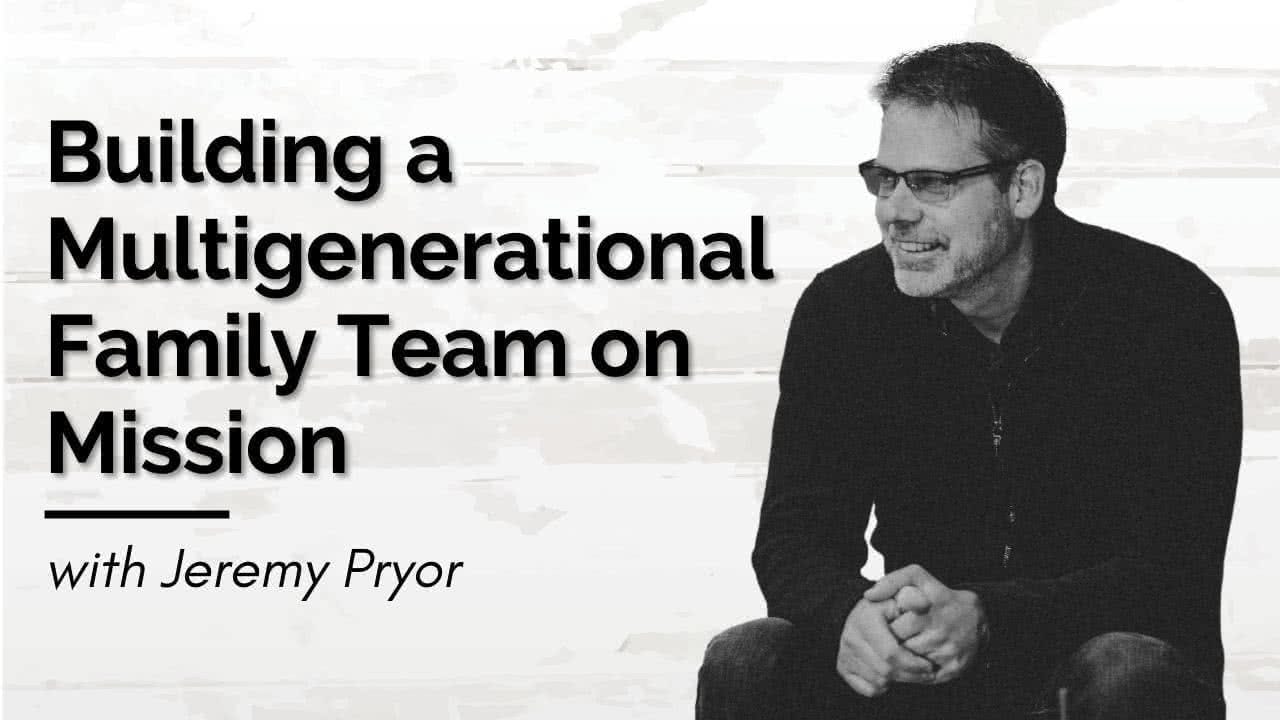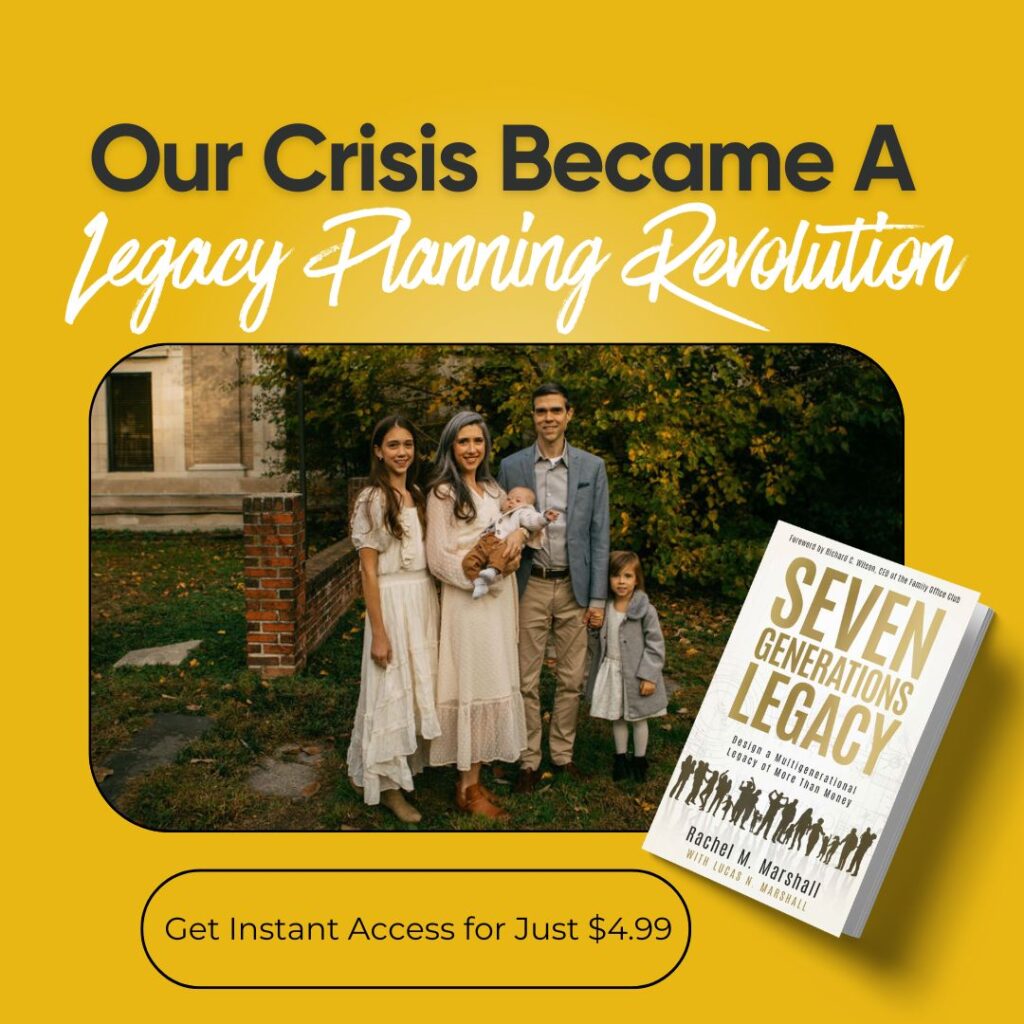
Building a Multigenerational Family Team, with Jeremy Pryor
We often talk about multigenerational legacy and multigenerational wealth, but beneath it, you need a multigenerational family team. Not just in name, but a strong team deeply committed to flourishing for generations.
Jeremy Pryor, Partner and Co-Founder of Family Teams, is helping families build a multigenerational team on a mission. They help parents think of families as a team, and coach the team to work together toward a common mission. They also give practical guidance for developing family rhythms, training, traditions, business, and home life.
If you’re looking for practical tools to strengthen your family, work together in business, and flourish for generations… tune in now!
Podcast: Play in new window | Download (Duration: 1:03:50 — 73.1MB)
Subscribe: Apple Podcasts | Spotify | Android | Pandora | RSS | More
Table of contents
Jeremy’s Introduction to Multigenerational Family Teams
Jeremy grew up in Seattle, and he describes it as a place that had very few flourishing families. It wasn’t until Jeremy studied abroad in Jerusalem that he became immersed in a culture that valued family foremost. Fatherhood, particularly, was a critical piece of the family culture in Jerusalem. To the people he met, the family was about legacy, and people viewed their family as a team or unit. It was at this point that Jeremy’s interest in creating his own multigenerational family sprouted.
What he found in his research was that multigenerational family teams or structures tended to occur when people were in survival mode. During periods of war, recession, or other hardship, families would rely more closely on each other. This helped to ensure the well being of everyone. Yet as things adapt to become “safe” again, the world becomes more individualistic.
The problem is that when people are individualistic, they lack stability, and can ultimately become isolated. Not only does this mean people are spending their final years alone, but there is little to no sense of generational security. Creating a family culture that centers around the whole unit’s ability to thrive fosters connection, confidence, and security.
Individualism is the Default Today
[11:58] “You actually have to ask people to make a choice, and it is a choice. Like you could just raise… your kids to be a group of individuals, and to reset every generation, and to have that 80-year memory that the typical western family has. Or, you could choose to be a multi-generational team and take on some things together, and have that long legacy memory. But you get to choose.”
[12:24] “In our culture, the vast majority of people… will choose to live out that individual life… because that’s the default, unfortunately. And that’s the reason why they’re doing it. That’s the reason why more and more people are living and dying alone. Because we don’t realize that we’re making a thousand small decisions to isolate ourselves from other relationships.”
Individualism vs. the Multigenerational Family Team
Because of an assumed sense of stability, as Jeremy shares, the multigenerational family team has all but disappeared in the US. People now rely on their own devices, rather than working with their families to create wealth and support each other. After all, in times of survival, it makes sense for families to rely more closely on each other. And when the nation prospers and life is good, people tend to branch out and forget the power of a family who works as a team.
[15:23] “You will, if you go on default, build an individualistic family; a springboard for individual success. That’s okay, you can do that…[but] there is another option. You can instead build a multigenerational family.”
The latter option takes work because it’s a family model that many people are unfamiliar with. It’s difficult to model something without a reference. Jeremy himself didn’t know a multigenerational structure was possible until his trip to Jerusalem. So it’s the onus of the parents to choose to raise their families more deliberately in this way.
Creating a Balanced Multigenerational Family Team
Building a multigenerational family team doesn’t mean the death of individuality. There actually has to be room for the members of the family to have individual expression within the family structure in order to thrive. There’s a balancing act of building a cooperative family that supports one another, with individuals who have a strong sense of self.
[17:24] “In our culture, we struggle with hyper-individualism. In other cultures, they struggle with hyper-familism, where the individual doesn’t matter. To me, the way that I’ve worked this out, is that I believe that the individual needs to be sovereign. In that, they need to make the decision. But that then, they need to be called to voluntarily sacrifice for the family team. So that’s the order in which I think is most healthy.”
This balance allows family members to live in their purpose or unique ability, rather than being crushed by the expectation of the family unit. However, it also creates a space for each individual to care about the whole family’s well-being in a way that helps everyone thrive.
[18:32] “In our family, I realize that that really kind of starts with me. My children have to see me making voluntary sacrifices of my individualism for the sake of the family team. And as they see that experience, they can make that decision or not make that decision. They can go on their own journey towards understanding how valuable this is, and choosing to sacrifice for it.”
The Hundred-Year Horizon
A trademark of the hyper-individualistic lifestyle is that it has about an 80-year memory. People are only planning as long as they’ll be alive, and not much beyond that. They’re not seeking to make their children rich, or their children’s children. They view every aspect of the family through the lens of separation and individualism. Yet, this individualistic thinking can keep people from creating a truly powerful legacy. It prevents people from leaving their families better off for generations to come.
[27:45] “If you have a hundred-year horizon, there’s so much you can do in a hundred years. But if you’re hyper-individualistic and consumeristic, who cares about a hundred years?”
Creating a multigenerational family team requires you to adopt a big-picture thinking. It compels you to aks the question: How will this decision impact my family a generation from now, or two generations? This type of processing helps you to be more intentional with each decision, and more actively cultivate a family culture of support. For example, an investment decision may have great short-term potential, but a long-term project may help you better convey family values and financial concepts to your children.
The “Intangible” Family Unit
There’s incredible value in crafting a multigenerational family team, yet for many people, it can seem like an intangible goal. If you weren’t raised within a team, or are still on your wealth-building journey, it’s difficult to think too far forward.
If the idea of a multigenerational family sounds good to you, just know that you can get started today. One of the most important parts of creating this type of family structure is to create a family culture that the members of your family can live up to. For example, you may create a family mission statement that inspires your children to live up to certain values and rules. When you encourage your children to take responsibility in the family culture, you create something that they want to contribute to, which is how you sustain the family for generations.
[34:58] “If the family is a group of individuals, the family is a bad experiment. It’s a poorly designed thing.”
Are There Dysfunctional Family Teams?
[38:11] “The dysfunctional family, the idea, has sort of become a meme. Like, ‘Of course every family is dysfunctional.’ That’s not true. There are all kinds of functioning families. The reason why that’s sort of becoming an assumption is because when you persistently go against the design, of course every one of those families is going to be dysfunctional. That’s almost the definition of dysfunction… We just have to introduce people to the fact that the family has a design, and it’s beautiful, and it works, and it’s highly functional. But if you don’t understand the design, and you continuously violate it, then of course it will devolve into dysfunction.”
[49:54] “That balance… is the ultimate challenge of family life… We cannot leave any of our kids behind and just say, ‘Oh… you are going to be sacrificed on the altar of the family.’ Like that is not a beautiful story. We need to make sure that our family, our identity, the family vision, what we’re doing as a family is broad enough to encompass all that the family is.”
The ideal family team, as Jeremy describes it, supports all of its members, not some of them. So if you grow your family to have someone with wildly different gifts, you expand your family to encompass that. That’s the true beauty of creating a family team—you are creating room for everyone to thrive individually, together. All for the greater good of the whole team.
About Jeremy Pryor
Jeremy met his wife April in Jerusalem in 1997, when they were students. They’ve spent the last 20 years building Team Pryor together. They have five kids: Kelsey, Jackson, Sydney, Elisa, and Kaira. They live in a multigenerational house with Jeremy’s parents and April’s mom in Fort Thomas, KY just a few miles from Cincinnati, Ohio.
They’ve founded and led several businesses and non-profits including Epipheo (a video production agency), Just Sew (a quilt shop), FamilyTeams.com (training content for families), 1000 Houses (a network of Cincinnati disciple-making households), and The Story-Formed Life (a discipleship training resource). For fun, the Pryors study Hebrew, take groups to Israel (join us), enjoy deep conversation over great food, and read Tolkien by firelight.
Book A Strategy Call
Do you want to coordinate your finances so that everything works together to improve your life today, accelerate time and money freedom, and leave the greatest legacy? We can help! Book an Introductory Call with our team today at https://themoneyadvantage.com/calendar/ and find out how Privatized Banking, alternative investments, or cash flow strategies can help you accomplish your goals better and faster.
The Power of Trusts for Generational Wealth with Joel Nagel
If you’re reading this, chances are you’ve already taken the first step towards securing your financial future. But what about the financial futures of your children, grandchildren, or even your great-grandchildren? The journey towards financial stability isn’t a one-generation game; it’s about creating a lasting legacy that will provide for your loved ones long after…
Read MoreEstate Planning 101: Protecting Your Loved Ones
Can you confidently say your family’s financial future is protected? Staring down the barrel of a life-altering moment, I was forced to confront the fragility of existence and the critical importance of having one’s affairs in order. That harrowing experience became a catalyst for today’s soul-searching episode of the Money Advantage podcast, where we navigate…
Read More



